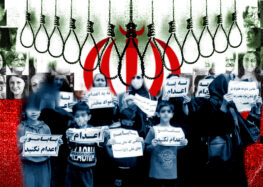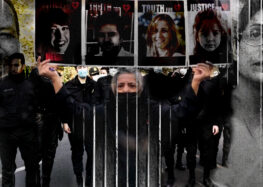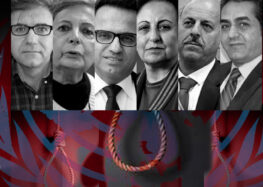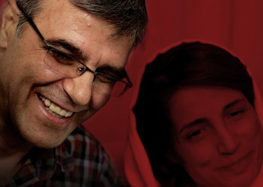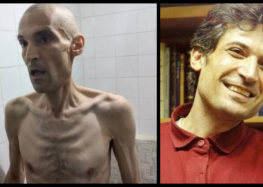Life of Jailed Human Rights Lawyer at Great Risk
UN High Commissioner Should Intervene Immediately
Family in Anguish over the Health of Hunger Striking Lawyer
(4 November 2010) The United Nations High Commissioner for Human Rights, Navi Pillay, should immediately intervene with Iranian authorities to ensure the physical well being of detained human rights lawyer Nasrin Sotoudeh, the International Campaign for Human Rights in Iran said today.
On Sunday, 31 October, Sotoudeh, one of Iran’s most prominent human rights lawyers went on a dry hunger strike protesting her detention and ill treatment inside Tehran’s Evin prison. Her family reported that her health is quickly deteriorating.
“As High Commissioner for Human Rights, Navi Pillay has a duty to come to the aid of embattled human rights defenders,” said Hadi Ghaemi, spokesperson for the Campaign. “Her failure to respond to systematic persecution and prosecution of human rights lawyers, including Sotoudeh, would be cause for concern.”
“Sotoudeh is putting her life on the line not only for the rights of people in Iran, but for the very principles the UN was founded to uphold,” he added.
Sotoudeh has been in detention since 4 September. Authorities have denied her contact with her lawyer and restricted family visits. Reza Khandan, her husband, told the Campaign that her two young children, three and eleven years old, managed to visit her for the first time today, to find her in seriously grave health. Khandan himself has been denied any visits, while Sotoudeh’s mother and sister accompanied her children to see her today and confirmed she is in bad health.
“She is in a terrible state. The kids cried and left the prison, struck with sadness. She has lost a lot of weight. Her skin has darkened, and she was too weak to hug the kids,” said Khandan.
Abbas Jafari Dolatabadi, Tehran’s chief prosecutor, met with Sotoudeh on Sunday afternoon, just before she began her hunger strike. Khandan told the Campaign that no developments came out of that meeting.
Sotoudeh, who has defended Nobel Laureate Shirin Ebadi and numerous other human rights activists, was arrested on 4 September 2010, and has been held in solitary confinement as she awaits trial on charges of “acting against national security,” “congregation and collusion with intent to disrupt national security,” and “cooperation with the Center for Human Rights Defenders.” Her trial is scheduled to start on 15 November. Colleagues have received reports that Sotoudeh has been tortured in order to coerce a confession.
“Previously, she had told the authorities in charge that if things improve and normal legal procedures are followed in her case, she would end her hunger strike. But her situation not only did not improve, it has worsened,” Khandan said.
“Her case is not following proper procedures,” Khandan added. “She is kept in an irregular situation. She has been in solitary confinement for days. I don’t understand why they would treat a lawyer like her this way. I think my wife noticed that the situation is irregular, and that’s why she has [gone on hunger strike].”
Sotoudeh’s case is part of a string of arrests and prosecutions of human rights lawyers in Iran, including those of Mohammad Oliaifard, Mohammad Ali Dadkhah, Abdolfattah Soltani, Giti Pourfazel, and Mohammad Seifzadeh.
Mohammad Oliaifard is serving a one year prison sentence solely for providing information about the judicial process to the media. On 30 October, Tehran’s Revolutionary Court sentenced Mohammad Seifzadeh to nine years in prison and a ten-year ban from practicing law. Mohammad Ali Dadkhah and Abdolfattah Soltani have open prosecutions against them. Giti Pourfazel, a lawyer representing Baha’i defendants, is summoned to appear in court on 7 November.
The United Nations Declaration on Human Rights Defenders, which the UN General Assembly adopted by consensus in 1998, declares that states “shall take all necessary measures to ensure the protection by the competent authorities of [human rights defenders] against any violence, threats, retaliation, de facto or de jure adverse discrimination, pressure or any other arbitrary actions” as a consequence of their legitimate effort to promote human rights.
The UN Basic Principles on the Role of Lawyers provide that lawyers must be allowed to carry out their work “without intimidation, hindrance, harassment or improper interference.” In addition, it affirms the right of lawyers to freedom of expression, also provided for in Article 19 of the ICCPR, which includes “the right to take part in public discussion of matters concerning the law, the administration of justice and the promotion and protection of human rights”.
On 31 October, Shirin Ebadi appealed for intervention by the High Commissioner regarding the persecution of Sotoudeh and other Iranian human rights lawyers. Given Sotoudeh’s subsequent dry hunger strike, Ebadi’s appeal should be treated as a matter of utmost urgency.


